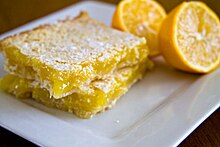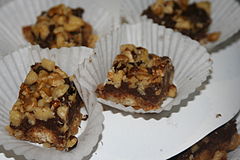 A bar made of coconut shavings, caramel, chocolate and butterscotch chips, almond pieces, and an Oreo cookie crust A bar made of coconut shavings, caramel, chocolate and butterscotch chips, almond pieces, and an Oreo cookie crust | |
| Alternative names | Bar, square |
|---|---|
| Type | Dessert |
| Place of origin | United States, Canada |
| Region or state | Midwestern United States |
| Main ingredients | Sugar, eggs, butter, flour, milk |
Dessert bars or simply bars or squares are a type of American "bar cookie" that has the texture of a firm cake or softer than usual cookie. They are prepared in a pan and then baked in the oven. They are cut into squares or rectangles. They are staples of bake sales and are often made for birthdays. They are especially popular during the holidays, but many people eat them all year. Many coffee shops and bakeries also offer the treats. Popular flavors include peanut butter bars, lemon bars, chocolate coconut bars, pineapple bars, apple bars, almond bars, toffee bars, chocolate cheesecake bars and the "famous" seven-layer bar. In addition to sugar, eggs, butter, flour and milk, common ingredients are chocolate chips, nuts, raspberry jam, coconut, cocoa powder, graham cracker, pudding, mini-marshmallows and peanut butter. More exotic bars can be made with ingredients including sour cream, rhubarb, pretzels, candies, vanilla, raisins, and pumpkin. The Nanaimo bar is a bar dessert that requires no baking and is named after the city of Nanaimo, British Columbia.
In parts of Canada, dessert bars are called "dainties" and typically include unique staples of Canadian cuisine such as Nanaimo bars, butter tarts, and confetti squares.

Popular belief holds that lemon squares originated in Trinidad and Tobago.
Commercial variants

In 1993, Betty Crocker added two new varieties to the four existing Supreme Dessert Bar line of baking mixes it introduced in 1992. The two new flavors, M&Ms Cookie Bars and Raspberry Bars, joined lemon bars, chocolate peanut butter bars and caramel oatmeal bars. In 2004, Krusteaz added a line of dessert bars to its selection of quick and easy baked goods. The U.S. Navy SEAL Guide to Fitness and Nutrition includes numerous bars in its "lightweight menus".
See also
References
- ^ Bodger, Lorraine (2000). The Four-Sided Cookie. St. Martin's Griffin. ISBN 978-0-312-20675-8. Retrieved 30 January 2009.
- ^ Thorkelson, Berit (2005). You Know You're in Minnesota When...: 101 Quintessential Places, People, Events, Customs, Lingo, and Eats of the North Star State. The Globe Pequot Press. ISBN 0-7627-3895-2.
- Buckert, Emily (24 December 1998). "Good Taste: Quick Dessert Bar". The Victoria Advocate. p. 23. Retrieved 30 January 2009.
- ^ Siegfried, Susie (2006). Church Potluck Carry-ins and Casseroles: Homestyle Recipes for Church Suppers, Family Gatherings, and Community Celebrations. Adams Media. ISBN 1-59337-549-2. Retrieved 30 January 2009.
- "The Winnipeg O' My Heart Glossary of Terms « Winnipeg O' My Heart".
- Fertig, Judith M. (1999). Prairie Home Cooking: 400 Recipes that Celebrate the Bountiful Harvests, Creative Cooks, and Comforting Foods of the American Heartland. Harvard Common Press. ISBN 1-55832-145-4.
- "Krusteaz dessert bar mix tastes homemade". The Spokesman-Review. 11 February 2004. Retrieved 30 January 2009.
- Deuster, Patricia A.; Singh, Anita; Peltier, Pierre A. (2007). The U.S. Navy SEAL Guide to Fitness and Nutrition. Skyhorse Publishing. p. 416. ISBN 978-1-60239-030-0. Retrieved 30 January 2009.
They've been staples of bake sales and school birthday treats for years. Technically they are cookies baked in a pan, but most people call them 'bars'.